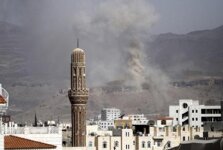Many Palestinians do not believe that Isaac Herzog or Tzipi Livni would be much different once they form a new government.

Palestinians from across the political spectrum said Monday that they were not pinning any hopes on the general elections in Israel, mainly because they do not see a difference between the two major powers, Likud and Labor (Zionist Union).
Although the Palestinian Authority’s official stance has been that the elections are an internal Israeli affair, some officials in Ramallah expressed hope that Prime Minister Binyamin Netanyahu and his Likud Party would lose the vote.
“We hope Israeli voters will wake up and vote this man out of office,” said a senior Fatah official. “A vote for Netanyahu and the right wing parties is a vote against peace and for more war and bloodshed.”
PA President Mahmoud Abbas said last week that the Palestinians would respect the choice of the Israeli voters and work with any leader they elect.
In private, however, Abbas and many senior Palestinian officials have been quoted as voicing hope that the right wing bloc in Israel would be weakened and removed from power.
Echoing this sentiment, the Palestinian daily Al-Quds, which is affiliated with the PA, published an editorial on Monday in which it strongly criticized Netanyahu and right wing leaders like Yisrael Beytenu’s Avigdor Liberman and Bayit Yehudi’s Natfali Bennett for “waging a campaign of incitement and lies against the Palestinians and their leaders and rights.”
The paper wrote that the statements and positions of these Israeli leaders “reaffirms that they are not partners for peace and are not seeking peace. Rather, they seek to consolidate the occupation and settlements and continue violating international law.”
Yet although Palestinians are eager to see Netanyahu and his political allies voted out of power, they do not believe that Isaac Herzog or Tzipi Livni would be much different once they form a new government.
“Neither Livni, Netanyahu’s former partner, nor Herzog, the former leader of the opposition, are prepared to make peace,” said Omar al-Ghul, a political analyst affiliated with the PA. “If anyone has doubts about this, they are invited to review the positions of Herzog and Livni to learn the truth about their stances.”
Al-Ghul urged Palestinians not to be optimistic about the “misleading” statements of Herzog, Livni and their friends in the Zionist Union. “They are all not prepared to pay the price for peace and that’s why the Palestinian leadership should be prepared for a fierce battle with the leaders of the Zionist Union.”
The analyst noted that Livni had previously voiced her opposition to an Israeli withdrawal to the pre-1967 lines and the “right of return” for Palestinian refugees. He also blasted Livni for “supporting the continuation of the blockade and death in the Gaza Strip.”
Abdel Nasser al-Najjar, chairman of the Fatah-dominated Palestinian Journalists’ Syndicate in the West Bank, said that the gap between the political platforms of the two major parties in Israel, especially with regards to the Palestinian issue, was “not big.”
“Herzog has stressed that Jerusalem is the eternal capital of Israel and would not be divided,” al-Najjar pointed out. “So what is the difference between him and Netanyahu? Isn’t this also the position of the Likud?”
Al-Najjar said that there was also no difference between the positions of Herzog and Netanyahu regarding settlements. Noting that Herzog recently visited Gush Etzion, he said that the leader of the Zionist Union was sending a message that settlements are a “Zionist issue” and that there construction there would continue.”
Faisal Abu Shahlah, a senior Fatah official in the Gaza Strip, told the Ma’an news agency that as far as he was concerned, there is no difference between the various Israeli parties with regards to the Palestinian issue and Jerusalem. “We feel that there is no difference between the Left and Right in Israel and they share the same policy toward the Palestinian issue,” he added. ‘That’s why we should not pin any hopes on any of them.”
Hamas’s top representative, Ismail Radwan, agreed. “We have no expectations from the elections because we don’t differentiate between the Right and Left,” he remarked. “They are all racing to further Judaize Jerusalem, build more settlements, continue the occupation and target our people.”





